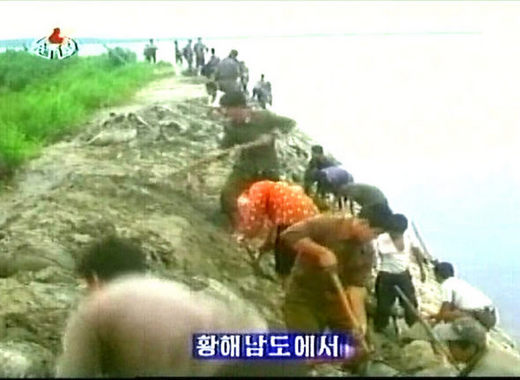Posted on : Jul.27,2006 11:50 KST
Modified on : Jul.28,2006 15:32 KST
If Pyongyang requests int'l help, Seoul will contribute
North Korea was seriously hit by the torrential rains that swept the peninsula in mid-July, with crops destroyed and thousands displaced. The South Korean government has a plan to provide food aid to the North should the communist nation officially request help from international organizations, such as the United Nations World Food Program (WFP).
Regarding food aid to the North, a government official who asked to be unnamed clarified that the nation’s policy for providing food aid to the North through international bodies has not changed, saying yesterday that if international organizations request help, "South Korea will support them."
Such a position by Seoul indicates that a policy of engagement with the North still prevails, and that support for flood-damaged North Korea has been divorced from problems arising after the North's missile tests on July 5 local time.
Inter-Korea relations hit a snag when Pyongyang put a halt to ongoing separated-family reunions and withdrew several staff members from the office for inter-Korean economic cooperation in Gaeseong (Kaesong), in retaliation for the South’s stopping of rice and fertilizer aid following the missile launches.
The government seems to be taking into consideration the words of private civic groups and experts on inter-Korean relations, who have criticized Seoul for initially linking humanitarian food aid to the missile crisis. The government may also hope its offer would help rekindle stalled South-North relations.
South Korea, so far, has provided food loans to the North of 300,000-500,000 tons annually. Separately, the South has provided additional food aid whenever the North has put in a request to international organizations, sending its aid through those organizations.
In an interview with Washington-based Radio Free Asia on July 26, Paul Risley, a spokesperson of the WFP's Bangkok office, said that in North Korea, the heavy rains claimed a large number of victims, and farmland totaling about 30,000 hectares was lost. North Korea is expected to suffer losses in their grain supply of about 100,000 tons in the fall as a result, he estimated.
The North’s Central News Agency on July 21 reported that several hundred people were dead or missing and tens of thousands of houses and buildings were destroyed or badly flooded. Pyongyang, however, has not yet requested emergency food relief from international organizations.
Spokesman Risley said he informed the North that the WFP is prepared to provide 74 tons of food aid to flood victims in Songchon-gun, South Pyongan Province, for a duration of 30 days. “We are waiting for the North¡?s response”, he added.







